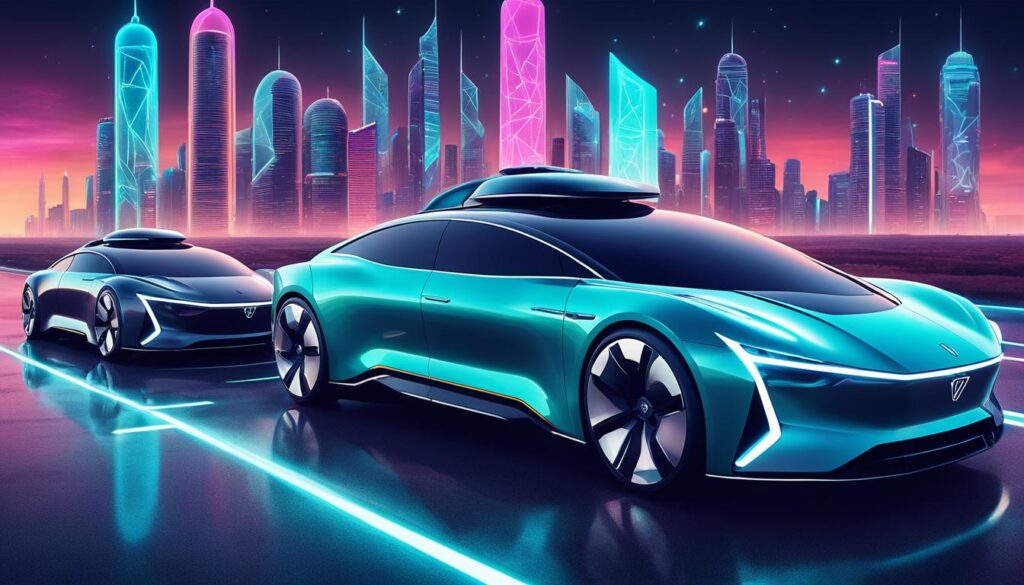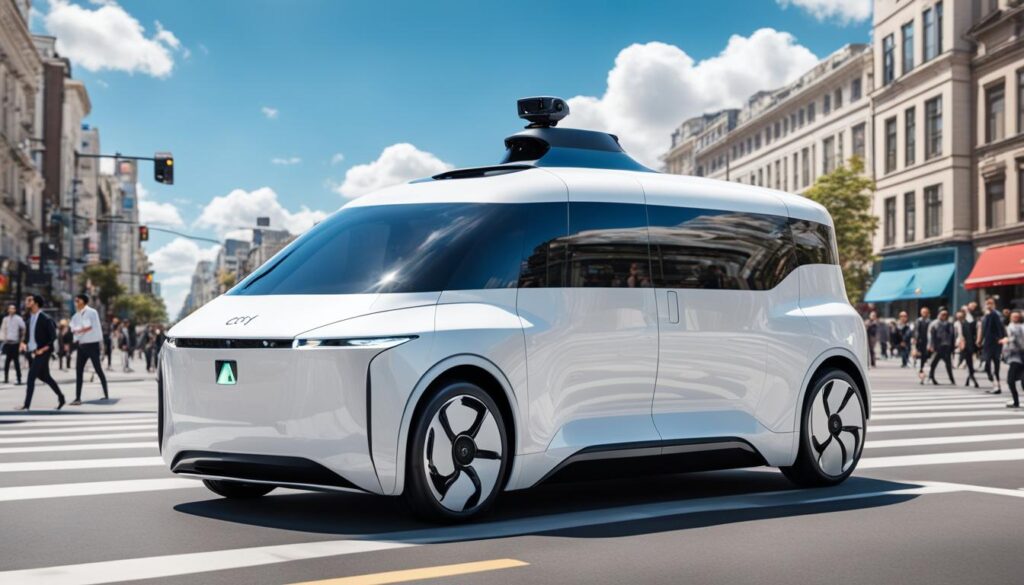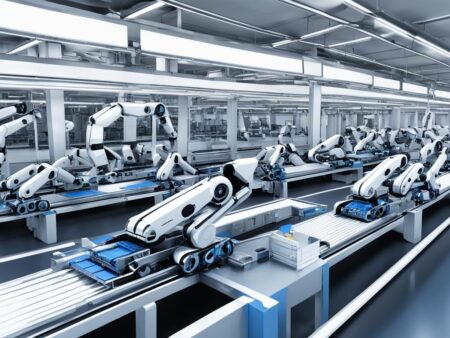Welcome to our blog, where we delve into the exciting world of autonomous vehicle technology. As a leading autonomous vehicle startup, our mission is to shape the future of transportation with innovative and groundbreaking solutions. Through the integration of machine learning and artificial intelligence (AI), we are revolutionizing the way we commute, making it safer, more efficient, and sustainable.
Self-driving cars have become more than just a concept; they are now a reality, offering endless possibilities for the transportation industry. At our autonomous vehicle startup, we are at the forefront of this technological revolution, combining cutting-edge AI algorithms and robotic technology to develop next-generation mobility solutions.
Our commitment to innovation has led us to be recognized as a prominent self-driving car company in the industry. By continually pushing the boundaries of what is possible, we strive to deliver the highest standard of autonomous vehicles, tailored to various purposes, whether it’s delivering groceries, providing ride-hailing services, or fostering a sustainable transportation ecosystem.
Join us on this exciting journey as we explore the impact of machine learning and AI in transportation, highlight the top autonomous driving startups, discuss the latest technological advancements, and delve into the safety, efficiency, sustainability, and economic opportunities associated with autonomous vehicles. Together, we can envision a future where transportation is smarter, safer, and more accessible for all.
The Impact of Machine Learning and AI in Transportation
Machine learning and AI are revolutionizing the transportation industry, transforming the way vehicles are designed, built, and operated. With the integration of these technologies, vehicles can now learn from data, enhance performance, and make intelligent decisions without human intervention. The emergence of autonomous vehicles showcases the power of machine learning and AI in transportation, enabling vehicles to navigate roads, simulate road conditions, and determine the most efficient routes for deliveries. This groundbreaking technology has attracted significant investment and funding for startups in the autonomous driving space.
Autonomous vehicles equipped with machine learning and AI capabilities have the potential to reshape transportation as we know it. These vehicles can process vast amounts of real-time data, enhancing their navigation capabilities, and allowing them to adapt to changing road conditions. By leveraging machine learning algorithms, autonomous vehicles can continuously learn from every experience, enabling them to make intelligent decisions that enhance safety and efficiency.
- Autonomous vehicles can navigate roads and adapt to changing road conditions.
- Machine learning algorithms enable vehicles to make intelligent decisions.
- Integrating AI technology allows vehicles to process real-time data for optimal performance.
| Benefits of Machine Learning and AI in Transportation |
|---|
| Enhanced safety through real-time data analysis and quick decision-making. |
| Efficient route planning for optimized delivery and transportation networks. |
| Reduced fuel consumption and emissions, contributing to a more sustainable future. |
As the transportation industry continues to evolve, machine learning and AI will play a pivotal role in shaping its future. Autonomous vehicles equipped with these technologies not only offer a glimpse into the future of transportation but also present countless opportunities for innovation and growth.
Top 10 Autonomous Driving Startups
When it comes to innovation in autonomous vehicle solutions, there are several standout startups making waves in the industry. These top 10 autonomous driving startups have secured significant funding and are at the forefront of transforming transportation with their cutting-edge technologies. Let’s take a closer look at each of them:
New Row Neuro
New Row Neuro offers advanced AI and machine learning solutions for autonomous vehicles. Their technology focuses on enhancing perception and decision-making capabilities, enabling vehicles to navigate complex environments with ease.
We Ride
We Ride is revolutionizing the autonomous ride-hailing industry with its state-of-the-art platform. Their innovative technology combines AI algorithms with real-time data analysis to provide safe and efficient autonomous transportation services.
Argo AI
Argo AI is a leader in developing self-driving technology for commercial vehicles. Their comprehensive software and hardware solutions enable seamless integration of autonomous capabilities, facilitating safer and more efficient transportation.
A.I. AI
A.I. AI specializes in creating intelligent systems for autonomous vehicles. Through their advanced AI algorithms, they enable vehicles to make intelligent decisions, adapt to changing road conditions, and deliver superior performance.
Iron Ride
Iron Ride is committed to making autonomous delivery a reality. Their innovative platform combines AI-powered logistics with cutting-edge robotics, allowing for efficient and reliable delivery of groceries and packages.
Pony AI
Pony AI focuses on developing autonomous driving technology for both urban and suburban environments. Their solutions enable vehicles to navigate diverse traffic scenarios, ensuring safety and efficiency in any setting.
Luminar Technologies
Luminar Technologies is a pioneer in lidar-based sensor technology for autonomous vehicles. Their high-resolution sensing systems provide vehicles with a detailed understanding of their surroundings, enhancing safety and reliability.
Motional
Motional is revolutionizing passenger transportation with their advanced autonomous driving technology. Their comprehensive platform focuses on passenger safety, comfort, and the seamless integration of autonomous features.
Momenta
Momenta is developing cutting-edge perception and mapping solutions for autonomous vehicles. Their AI-powered algorithms enable vehicles to accurately perceive their environment, creating a foundation for safe and efficient autonomous driving.
Baidu
Baidu is a leading technology company driving innovation in autonomous driving. Their autonomous vehicle solutions combine state-of-the-art AI algorithms with robust hardware, paving the way for a safer and more connected future of transportation.

These top autonomous driving startups are pioneers in the industry, pushing the boundaries of innovation and shaping the future of transportation. With their groundbreaking technologies, they are poised to revolutionize the way we travel and deliver goods, offering safer, more efficient, and sustainable autonomous vehicle solutions.
Technological Advancements in Autonomous Vehicles
At the forefront of revolutionizing transportation, autonomous vehicle startups are driving technological advancements in the development and implementation of cutting-edge autonomous vehicle technology.
Leveraging AI and robotics, these innovative startups are paving the way for next-generation mobility solutions that are set to reshape the future of transportation. By harnessing the power of AI, these startups are creating vehicles capable of making intelligent decisions and navigating the roads autonomously.
Through continuous research and development efforts, autonomous vehicle startups are focused on advancing autonomous vehicle technology, making significant strides in enhancing safety, efficiency, and sustainability.
By integrating AI-powered systems into their vehicles, these startups are pushing the boundaries of what autonomous vehicles can achieve. Through the use of AI algorithms, they are able to analyze real-time data, identify potential hazards, and respond swiftly, reducing the risk of accidents caused by human error.
In terms of efficiency, autonomous vehicles are optimized to choose the most effective routes, minimizing travel time and fuel consumption. With the ability to analyze data related to traffic patterns and road conditions, these vehicles can navigate through busy streets and choose the most efficient paths, ultimately streamlining transportation networks.
Moreover, autonomous vehicles powered by AI technology contribute to sustainability efforts by reducing emissions. Electric-powered autonomous vehicles significantly reduce the carbon footprint compared to traditional gasoline-powered vehicles. In addition, AI algorithms optimize energy consumption, leading to efficient battery usage and minimizing waste.
With each technological milestone, autonomous vehicle startups are reshaping the landscape of transportation. Their dedication to advancing autonomous vehicle technology is driving the industry forward, propelling us into a future of safer, more efficient, and sustainable mobility solutions.
Autonomous Vehicles and Safety
One of the primary benefits of autonomous vehicles is enhanced safety. AI-powered systems enable vehicles to analyze real-time data from sensors, cameras, and radars, leading to quick decision-making and immediate response to potential hazards. The continuous learning capabilities of AI algorithms also allow vehicles to adapt to changing road conditions and learn from every experience, ultimately reducing the risk of accidents caused by human error.
By harnessing the power of AI, autonomous vehicles can significantly contribute to risk reduction on the roads. Autonomous systems are designed to detect and respond to dangers with lightning speed, far surpassing human reaction times. This ability to instantly process vast amounts of data enables autonomous vehicles to navigate complex environments, anticipate potential risks, and take appropriate actions to avoid accidents.
AI-powered systems in autonomous vehicles undergo rigorous testing, both in simulated scenarios and real-world environments, to ensure their reliability and safety. These systems continuously improve and optimize their performance through machine learning algorithms. With each encounter, autonomous vehicles learn from their experiences, refining their decision-making capabilities and becoming even better equipped to handle challenging situations.
The introduction of autonomous vehicles also has the potential to address human error, which is a significant contributing factor to road accidents. According to the National Highway Traffic Safety Administration (NHTSA), approximately 94% of accidents in the United States are attributable to human error. By replacing human drivers with AI-powered systems, autonomous vehicles can significantly reduce the occurrence of accidents caused by distracted driving, fatigue, impaired judgment, and other human-related factors.
In addition to their ability to improve road safety, autonomous vehicles hold the promise of reducing traffic congestion. Through AI algorithms, these vehicles can communicate with each other and optimize their movements, allowing for smoother traffic flow and minimizing the risk of collisions. By reducing congestion, autonomous vehicles can contribute to a more efficient and safer transportation system overall.

The integration of AI-powered systems in autonomous vehicles promises a future where transportation is safer, more efficient, and less prone to human error. As this technology continues to advance, we can expect significant improvements in autonomous vehicle safety, ultimately leading to a future with fewer accidents, injuries, and loss of life on our roads.
Efficiency in Autonomous Vehicles
Autonomous vehicles are transforming transportation with their efficient solutions, optimizing routes, minimizing traffic congestion, and streamlining transportation networks. Through the utilization of AI and machine learning algorithms, these vehicles harness real-time data related to weather conditions, traffic patterns, and infrastructure updates. This data analysis empowers them to select the most efficient paths and adjust their speed accordingly, ultimately reducing travel time and fuel consumption.
By leveraging AI technology, autonomous vehicles can analyze various factors such as traffic flow, road conditions, and historical data to make data-driven decisions. This allows them to find the most efficient routes and avoid bottlenecks or congested areas, ensuring a smooth and time-saving journey for passengers and goods.
Optimized Routes for Efficient Transportation
The advanced AI algorithms of autonomous vehicles enable them to continuously analyze and update route information in real-time. The vehicles can consider variables such as traffic volume, road conditions, and even unexpected incidents to optimize their routes on the go. This dynamic route optimization reduces unnecessary detours and maximizes efficiency, resulting in significant time and cost savings.
Minimized Fuel Consumption
Efficient transportation goes hand in hand with reduced fuel consumption. Autonomous vehicles leverage their AI-powered systems to analyze factors like traffic patterns, speed limits, and road conditions to adjust their driving behavior and optimize fuel usage. By minimizing abrupt acceleration and deceleration and maintaining a steady pace, these vehicles can significantly reduce fuel consumption and minimize their environmental impact.
Data-Driven Decision Making
The utilization of AI and machine learning algorithms allows autonomous vehicles to continuously analyze vast amounts of data from various sensors, cameras, and sources. This data-driven approach enables autonomous vehicles to make intelligent decisions based on real-time information, optimizing their performance and achieving maximum efficiency.
| Benefits of Efficiency | Examples |
|---|---|
| Reduced travel time | Passengers reaching their destinations faster |
| Lower fuel consumption | Reduced carbon footprint and cost savings |
| Minimized traffic congestion | Improved overall traffic flow and reduced delays |
| Enhanced productivity | Opportunity for passengers to engage in other activities during the journey |
Autonomous Vehicles and Sustainability
At our innovative startup, we firmly believe that the integration of AI and robotics in autonomous vehicles plays a significant role in advancing global sustainability goals. Electric-powered autonomous vehicles offer a compelling solution to reduce greenhouse gas emissions and combat climate change. Compared to traditional gasoline-powered vehicles, electric autonomous vehicles have a substantially lower carbon footprint, making them a more sustainable choice for the future.
By utilizing AI algorithms, autonomous vehicles can optimize energy consumption, minimizing waste and maximizing the efficiency of battery usage. This intelligent energy management system not only enhances the vehicle’s performance but also contributes to a sustainable environment.
In addition to reducing emissions, autonomous vehicles also enable a paradigm shift from vehicle ownership to mobility as a service. This shift can lead to a significant reduction in the need for extensive parking infrastructure, minimizing urban sprawl and environmental degradation. The adoption of autonomous vehicles can transform our cities into more pedestrian-friendly and greener spaces, improving the quality of life for urban residents.
Benefits of Electric Autonomous Vehicles for Sustainability:
| Benefits | Explanation |
|---|---|
| Reduced emissions | Electric autonomous vehicles produce little to no tailpipe emissions, significantly reducing greenhouse gases and air pollution. |
| Optimized energy consumption | AI algorithms optimize the energy usage of electric autonomous vehicles, minimizing waste and maximizing efficiency. |
| Decreased need for parking infrastructure | With the shift to mobility as a service, the demand for extensive parking infrastructure decreases, freeing up space for green areas and reducing environmental footprint. |
As we continue to push the boundaries of autonomous vehicle technology, sustainability remains a key focus. Through our commitment to electric autonomous vehicles and the optimization of energy usage, we strive to create a future with reduced emissions and a cleaner environment for generations to come.
Economic Opportunities in the Autonomous Vehicle Industry
The autonomous vehicle industry is not only revolutionizing transportation but also creating significant economic opportunities. The development and implementation of AI and robotics in this industry have opened up new avenues for job creation, innovation, and entrepreneurial ventures.
The integration of AI and robotics has spurred innovation in the autonomous vehicle industry. Companies are actively researching and developing cutting-edge technologies, driving the demand for skilled professionals in research, engineering, and manufacturing. These advancements have given rise to a plethora of job opportunities, attracting talented individuals to contribute to the growth and success of autonomous vehicle startups.
In addition to job creation, the emergence of autonomous vehicle-related services has paved the way for entrepreneurial ventures. Startups are leveraging this technology to provide services such as remote vehicle monitoring, fleet management, and data analytics. These services cater to the specific needs of autonomous vehicles and offer lucrative business opportunities for aspiring entrepreneurs.
Furthermore, the integration of AI and robotics in autonomous vehicles has the potential to enhance accessibility and inclusivity in transportation. By automating the driving experience, autonomous vehicles can provide transportation options for individuals who may have been previously excluded, such as the elderly or people with disabilities. This promotes a more inclusive society and opens up new possibilities for economic growth.
In conclusion, the rise of autonomous vehicles brings about not only technological advancements but also economic opportunities. Job creation, entrepreneurial ventures, and the development of autonomous vehicle-related services contribute to the growth of the industry and drive innovation forward. As autonomous vehicles become more prevalent, the economic impact is expected to continue expanding, benefiting communities and individuals alike.
Autonomous Vehicle Industry: A Global Phenomenon
The global autonomous vehicle revolution is transcending borders and igniting a wave of innovation across the world. Leading cities such as New York City, Los Angeles, London, and Bangalore have emerged as hotspots for autonomous technology, attracting startups and nurturing a thriving ecosystem of borderless innovation. The global movement towards autonomous vehicles is propelled by a combination of factors, including strong governmental support, forward-thinking regulatory frameworks, increasing consumer demand, and remarkable technological advancements.
Technological advancements in AI, machine learning, and robotics have paved the way for the rapid development and deployment of autonomous vehicle solutions. These disruptive technologies enable vehicles to learn from data, make intelligent decisions, and navigate roads with precision. The integration of AI-powered systems allows for real-time analysis of various factors, such as road conditions, traffic patterns, and infrastructure updates, ensuring optimized routes and efficient travel.
From an environmental standpoint, autonomous vehicles play a pivotal role in promoting sustainability. Electric-powered autonomous vehicles reduce greenhouse gas emissions, contributing to a cleaner and greener future. Furthermore, AI algorithms optimize energy consumption, minimizing waste and maximizing battery efficiency. The shift towards autonomous vehicles also enables a transition from vehicle ownership to mobility as a service, reducing the need for extensive parking infrastructure and alleviating urban pollution.
The global autonomous vehicle revolution is not just a disruptive force in the transportation industry; it is a catalyst for economic growth and job creation. The development and implementation of AI and robotics in autonomous vehicles have given rise to entrepreneurial ventures and opened new avenues of employment in research, engineering, manufacturing, and the emerging field of autonomous vehicle-related services. As the industry continues to evolve, accessibility to transportation is enhanced, providing mobility options for individuals who were previously excluded.
FAQ
Q: What are autonomous vehicles?
A: Autonomous vehicles are vehicles that can operate and navigate without human intervention. They utilize advanced technologies such as machine learning and AI to analyze data and make intelligent decisions.
Q: What is an autonomous vehicle startup?
A: An autonomous vehicle startup is a company that focuses on developing and implementing innovative autonomous vehicle technology. These startups aim to reshape transportation by creating advanced autonomous mobility solutions.
Q: How do autonomous vehicles enhance safety?
A: Autonomous vehicles enhance safety through AI-powered systems that can quickly analyze real-time data and respond to potential hazards. They also have continuous learning capabilities, allowing them to adapt to changing road conditions and learn from every experience.
Q: How do autonomous vehicles optimize efficiency?
A: Autonomous vehicles optimize efficiency by analyzing real-time data related to weather conditions, traffic patterns, and infrastructure updates. Through AI and machine learning algorithms, they choose the most efficient routes and adjust their speed accordingly, leading to reduced travel time and fuel consumption.
Q: How do autonomous vehicles contribute to sustainability?
A: Autonomous vehicles contribute to sustainability by reducing greenhouse gas emissions. Electric-powered autonomous vehicles significantly decrease emissions compared to traditional gasoline-powered vehicles. AI algorithms also optimize energy consumption, minimizing waste and maximizing efficiency in battery usage.
Q: What economic opportunities are there in the autonomous vehicle industry?
A: The autonomous vehicle industry has created economic opportunities in research, engineering, and manufacturing, leading to job creation. Additionally, the emergence of autonomous vehicle-related services such as fleet management and data analytics has opened doors for entrepreneurial ventures.
Q: Is the autonomous vehicle revolution a global phenomenon?
A: Yes, the autonomous vehicle revolution transcends borders and has become a global phenomenon. Cities around the world, such as New York City, Los Angeles, London, and Bangalore, have become hotbeds for autonomous technology, attracting startups and encouraging innovation.









